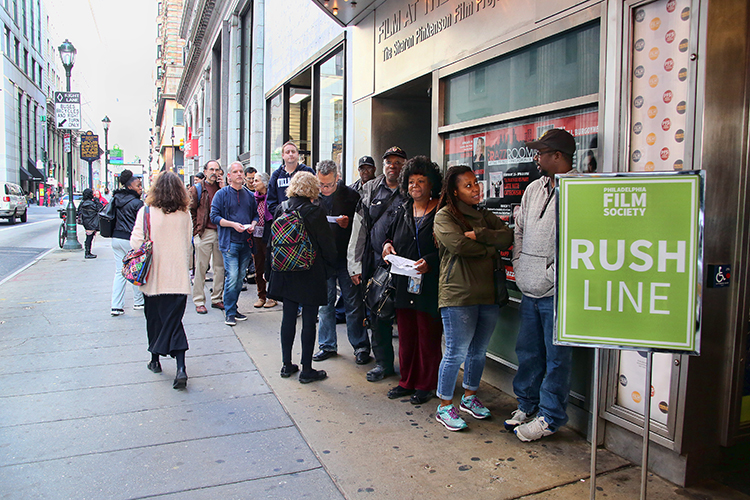Lights, Camera, Action!
by Walter Foley
Everyone knows “the media is the message,” but as the second annual Philadelphia Environmental Film Festival expands in size and scope, we’re reminded that the message—naturally—is also the message.
“Some documentaries can go on and on and on, often repeating things,” says PHEFF Artistic Director Alexandra Drobac Diagne as she excitedly describes this year’s shortest film. “So, to see someone condense it down to a 30-second nutshell is like, ‘Bingo! You win.’”
From April 6 to 8, the Prince Theater in Center City will screen 25 new short films and nine features—some produced on a shoestring budget, others with Oscar buzz—from all over the world.
PHEFF organizers have expanded educational programming this year to include a Friday morning of environmental films curated for more than 400 Philadelphia-area schoolchildren, along with a short-film competition and a lesson plan on plastic pollution in the waterways.
The festival’s opening feature is “Chasing Coral,” a documentary that made the Academy Awards’ shortlist about the loss of coral in the Great Barrier Reef and elsewhere. A Q&A with director Jeff Orlowski will be moderated by Carol Collier, director of the environmental studies and sustainability program at the Academy of Natural Sciences of Drexel University.
Many of the films’ directors will attend the festival, and most screenings are supplemented with discussions moderated by local experts. A panel at 11:30 a.m. on April 7 dubbed “Philly Rising!” includes the city’s managing director, the vice president of the Saint-Gobain manufacturing company, the commissioner of Parks and Recreation, and the urban conservation program director for the Pennsylvania chapter of the Nature Conservancy. The April 7 screening of “Wasted! The Story of Food Waste” will include a Q&A with director Anna Chai, moderated by Philabundance Executive Director Glenn Bergman.
The 12-member selection jury is made up of environmental experts, film industry professionals and creatives who watched all 265 films submitted to PHEFF—up from about 200 last year. PHEFF Executive Director Debra Wolf Goldstein heads Conservation Matters, which provides legal and policy advice to environmental organizations, has served as vice president of the Fairmount Park Commission and has chaired the land-use committee of the Philadelphia Commission on Parks and Recreation.
Thirty-three of the selected films will be Pennsylvania premieres, and two are fresh from Sundance Film Festival, which often showcases the year’s most impactful environmental films, Diagne says.
“We had many more films that we could have used that we had to make hard decisions on—like if they repeated a topic, for instance,” Diagne says. “We have to make sure we cover lots of topics and lots of styles.”
The leaders of PHEFF, a nonprofit, have so far been able to show every film they’ve wanted, and they hope to screen three or four Sundance films next year. They drew submissions from a larger pool of countries (34 last year, 43 this year) and were able to promote more films made by women.
“We have 11 women directors, which in our current climate—including Frances McDormand’s wonderful speech and the #MeToo movement—was something we were happy to highlight,” said Diagne, who has curated the Madison Museum of Contemporary Art and has worked on art house and blockbuster films, including “Terminator 2: Judgment Day,” “Titanic” and “Avatar.”
All of the films at the festival are family friendly, although Diagne points out that “Wasted!” includes the often colorful vocabulary of celebrity chef Anthony Bourdain.
“Person of the Forest,” a 17-minute film about recent research on endangered orangutans in the vanishing lowlands of Borneo, shows them making pillows, fashioning umbrellas and displaying regional greetings.
April 8 includes a screening of “The New Fire,” which focuses on a group of young nuclear engineers who see a safe and clean future in nuclear energy and hope to clarify misconceptions about its dangers.
This year, PHEFF will close with the documentary “Blue,” from Australian director Karina Holden, about how industrial-scale fishing, habitat destruction, species loss and pollution affect the oceans.
The April 6 pre-festival opening is curated for six local schools, whose students spent weeks prior to the festival workshopping environmental topics with their teachers. Dylan D’Haeze, a 14-year-old director, will screen his films “Plastic Is Forever” and “Tipping Point” and help guide the students in follow-up activities and discussions.
“Last year, we wanted to have a good film festival, keeping it bare bones,” Diagne says. “This is our year of expanding the concept a little further, and it’s our first attempt at real school outreach… We’re getting kids into the theater and packing that theater for impact—440 seats filled, where we can really relay a message.”









